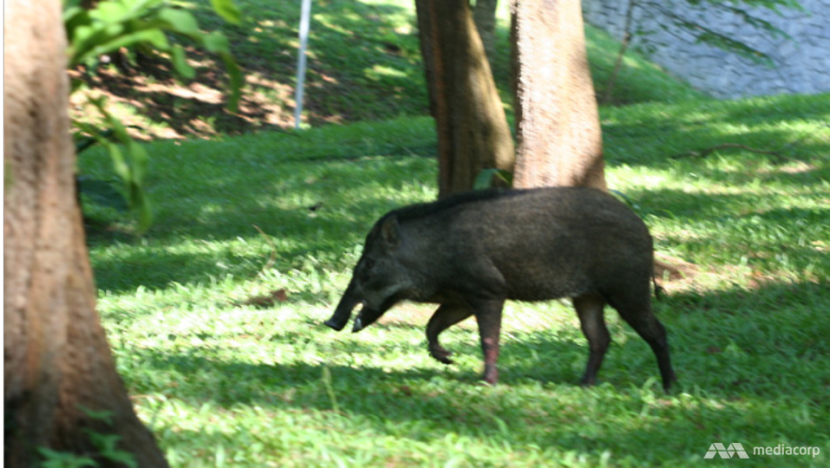17 more cases of African swine fever found in wild boars in Singapore
African swine fever cannot be transmitted to humans and is not a risk to public health, says the Animal and Veterinary Service.

A wild boar in Singapore. (File photo)
SINGAPORE: Another 17 cases of African swine fever have been detected in wild boars in Singapore.
According to the latest report by the World Organisation for Animal Health (WOAH) on Feb 24, there are now 18 cases recorded in Singapore, more than two weeks after the National Parks Board (NParks) confirmed the country's first case on Feb 7.
Of the 18 cases, 15 were detected in wild boar carcasses while the remaining three were trapped wild boars. The three trapped boars were killed and disposed of, said WOAH.
In its epidemiological comments, it said the virus has been detected in wild boars in forested areas and nature parks in several parts of Singapore. The situation is deemed "sufficiently stable", it added.
In response to CNA's queries, an NParks spokesperson said on Friday (Mar 10) that the virus samples were largely found in the north of Singapore.
"NParks is currently studying how ASF (African swine fever) came to be found in wild boars in Singapore," said Dr Chang Siow Foong, group director at NParks' Animal and Veterinary Service (AVS)
"There is currently no vaccine or treatment for ASF. Wild boars that exhibit signs of the disease will be euthanised on welfare grounds, and carcasses found will be disposed of."
Dr Chang added that African swine fever is endemic in Southeast Asia and spreads mainly through infected wild boars and pigs as well as contaminated materials.
According to AVS, the disease only affects members of the pig family.
African swine fever is not zoonotic, which means it cannot be transmitted to humans, and it is not a risk to public health, AVS added.
"Members of the public are reminded to stay on designated trails when visiting nature reserves, parks, and other green spaces, observe wild boars from a distance, and not to feed or get close to them," said the agency on its website.
The Philippines on Mar 6 announced a temporary ban on the import of pork products from Singapore. These include pork meat, pig skin, and porcine processed animal proteins.
Such items will be confiscated at all major ports of entry, said Mr Domingo F Panganiban, senior undersecretary of the Philippines’ Department of Agriculture, in a memorandum order.
Although Singapore is not an accredited exporter of pork products, Mr Panganiban said there is a need to prevent the entry of any "African swine fever-susceptible products" originating from Singapore that might be hand carried into the Philippines.
The ban will remain enforced unless revoked in writing, said the order.
Wild boars are native to Singapore and can be found in nature reserves, parks and other green spaces. AVS said it is "closely monitoring the health of wild boars in these areas".












